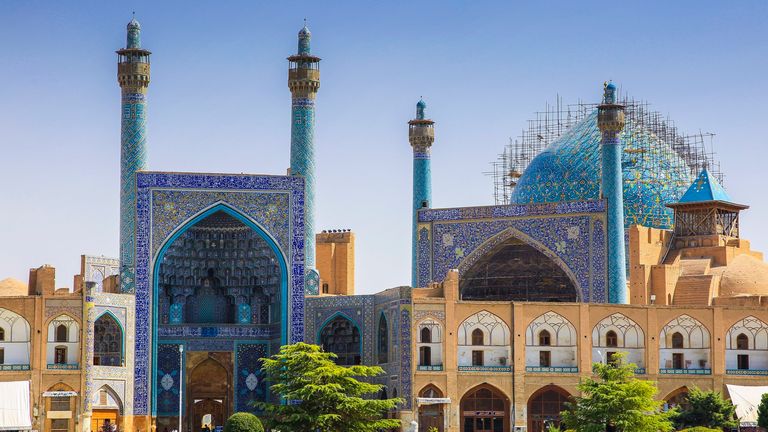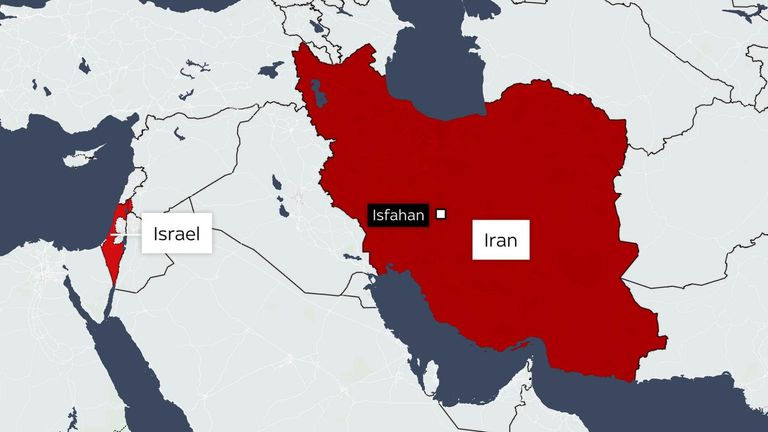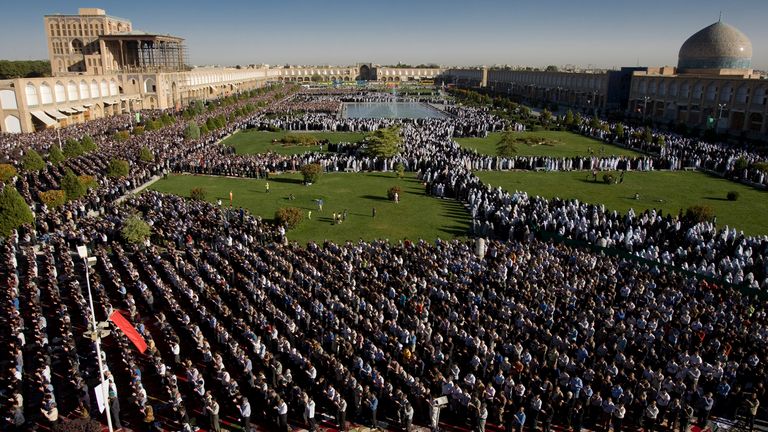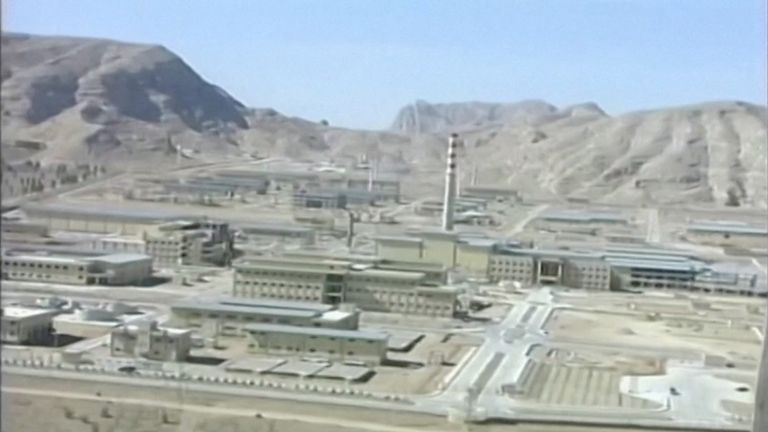Israel has targeted the city of Isfahan in retaliation for the barrage of missiles and drones Iran deployed over the weekend. But why Isfahan?
Michael Drummond
Foreign news reporter @MikeRDrummond
Friday 19 April 2024

Shah Mosque in Naghsh-e Jahan Square, Isfahan, Iran. Pic: AP
The city of Isfahan has been targeted in an Israeli strike in retaliation for the barrage of missiles and drones that Iran unleashed at the weekend.
The attack, details of which are still emerging, coincided with the birthday of Iran's supreme leader, Ayatollah Ali Khamenei.
Sponsored link
So far, there have not been any reports of damage or casualties.
Where is Isfahan and how significant is it? Sky News takes a look at Iran's third-largest city.
Follow latest: Tehran has 'no plan for immediate retaliation'

It was once the capital of Persia
Located in the centre of modern-day Iran at the nexus of the major north-south and east-west routes, Isfahan emerged as the capital of Persia in 1598.
Today it retains much of its history and the city is famous for its Islamic architecture such as tiled mosques and minarets.
It's home to around 2.2 million people.
The huge Naqsh-e Jahan Square in the city was designated a World Heritage Site by UNESCO.

The city of Isfahan has been targeted in an Israeli strike in retaliation for the barrage of missiles and drones that Iran unleashed at the weekend.
The attack, details of which are still emerging, coincided with the birthday of Iran's supreme leader, Ayatollah Ali Khamenei.
Sponsored link
So far, there have not been any reports of damage or casualties.
Where is Isfahan and how significant is it? Sky News takes a look at Iran's third-largest city.
Follow latest: Tehran has 'no plan for immediate retaliation'

It was once the capital of Persia
Located in the centre of modern-day Iran at the nexus of the major north-south and east-west routes, Isfahan emerged as the capital of Persia in 1598.
Today it retains much of its history and the city is famous for its Islamic architecture such as tiled mosques and minarets.
It's home to around 2.2 million people.
The huge Naqsh-e Jahan Square in the city was designated a World Heritage Site by UNESCO.

Naqhsh-e Jahan Square in Isfahan during the festival of Eid-al-Fitr.
It also has an airbase that has long been home to Iran's fleet of American-made F-14 Tomcat fighter jets, bought before the 1979 Islamic Revolution.
What connection does Isfahan have with Iran's nuclear programme?
Iran's nuclear research has long been a bone of contention with the West - worried that Tehran could be seeking to develop a nuclear weapon.
Israel has vowed never to let Iran obtain nuclear weapons. Iran has always denied having any intention to build a nuclear weapon.
There are nuclear facilities at a range of locations across the country, including in and around Isfahan.

It also has an airbase that has long been home to Iran's fleet of American-made F-14 Tomcat fighter jets, bought before the 1979 Islamic Revolution.
What connection does Isfahan have with Iran's nuclear programme?
Iran's nuclear research has long been a bone of contention with the West - worried that Tehran could be seeking to develop a nuclear weapon.
Israel has vowed never to let Iran obtain nuclear weapons. Iran has always denied having any intention to build a nuclear weapon.
There are nuclear facilities at a range of locations across the country, including in and around Isfahan.

A nuclear site near Isfahan in Iran in 2005. Pic: Reuters
The facility at Isfahan operates three small Chinese-supplied research reactors, as well as handling fuel production and other activities for Iran's civilian nuclear programme.
There's also the Natanz uranium enrichment plant, located in the wider province but outside the city itself.
Nuclear site safe - Iranian media
'There was nothing going on' said an Iranian news agency reporter at the Isfahan nuclear site
What happened to the city in the Israeli strike?
Details are still emerging about the Israeli strike on Iran, including any impact on Isfahan.
Air defences were fired in several Iranian provinces, including from a major military airbase and nuclear facilities near Isfahan, where state media said three drones had been shot down.
Iranian state media television said the nuclear facilities near the city were "fully safe".
The UN's nuclear watchdog, the International Atomic Energy Agency, also said there was no damage but said it was monitoring the situation "very closely" and called for "extreme restraint".
Sky News's military analyst Michael Clarke said Isfahan "would make sense" as a target as it hosts one of the least sensitive nuclear sites.
"It's a research site, about 3,000 or so scientists work there and there's no evidence this was targeted on the nuclear site," he added.
"But the fact that Isfahan is one of the cities that does quite a lot of nuclear work is also symbolically quite important, I think, if the Israelis are indicating that they're not frightened to go after these sites."
The facility at Isfahan operates three small Chinese-supplied research reactors, as well as handling fuel production and other activities for Iran's civilian nuclear programme.
There's also the Natanz uranium enrichment plant, located in the wider province but outside the city itself.
Nuclear site safe - Iranian media
'There was nothing going on' said an Iranian news agency reporter at the Isfahan nuclear site
What happened to the city in the Israeli strike?
Details are still emerging about the Israeli strike on Iran, including any impact on Isfahan.
Air defences were fired in several Iranian provinces, including from a major military airbase and nuclear facilities near Isfahan, where state media said three drones had been shot down.
Iranian state media television said the nuclear facilities near the city were "fully safe".
The UN's nuclear watchdog, the International Atomic Energy Agency, also said there was no damage but said it was monitoring the situation "very closely" and called for "extreme restraint".
Sky News's military analyst Michael Clarke said Isfahan "would make sense" as a target as it hosts one of the least sensitive nuclear sites.
"It's a research site, about 3,000 or so scientists work there and there's no evidence this was targeted on the nuclear site," he added.
"But the fact that Isfahan is one of the cities that does quite a lot of nuclear work is also symbolically quite important, I think, if the Israelis are indicating that they're not frightened to go after these sites."

No comments:
Post a Comment